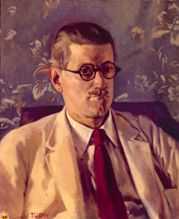Stephen James Joyce
Stephen James Joyce (born 15 February 1932) is the grandson of James Joyce and the controversial executor of Joyce's estate. He was born in France, the son of James Joyce's son, Giorgio, and Helen Joyce, née Kastor. Stephen attended Harvard University, graduating in 1958. At Harvard, he once roomed with Paul Matisse, grandson of French impressionist painter Henri Matisse, and with Sadruddin Aga Khan.[1] Thereafter, he worked for the Organisation for Economic Co-operation and Development on African development. He retired from the OECD in 1991 to focus on managing his grandfather's estate. He and his wife, Solange Raythchine Joyce, live in the Île-de-ré in France. They have no children; Stephen is James Joyce's sole living descendant.[2]
Stephen Joyce and Seán Sweeney are the joint trustees of the Estate of James Joyce. He has taken an active role in all legal matters relating to Joyce's works.[3] He has brought numerous lawsuits or threats of legal action against scholars, biographers, and artists attempting to quote from Joyce's literary work or personal correspondence.[4]
In 2004, Joyce threatened legal action against the Irish government when the Rejoyce Dublin 2004 festival proposed public reading of excerpts of Ulysses on Bloomsday.[5] In 1988 Stephen Joyce burnt a collection of letters written by Lucia Joyce, his aunt.[6] In 1989 he forced Brenda Maddox to delete a postscript concerning Lucia from her biography Nora: The Real Life of Molly Bloom.[4] After 1995 Stephen announced no permissions would be granted to quote from his grandfather's work.[4] Libraries holding letters by Joyce were unable to show them without permission.[4] Versions of his work online were disallowed.[4] Stephen claimed to be protecting his grandfather's and his family's reputation, but would sometimes grant permission to use material in exchange for fees that were often "extortionate".[4]
On 1 January 2012, on the 70th anniversary of Joyce's death, all of his works entered the public domain[4] in much of the world. In the US however, some of Joyce's work remains protected by copyright. Prior to this, in 2007, Joyce's hold on the estate had already been delimited by a fair use suit brought by Carol Loeb Schloss and the Stanford Law School Center for Internet and Society's Fair Use Project.[4]
When the Central Bank of Ireland issued a ten euro James Joyce commemorative coin on 10 April 2013, Stephen Joyce described the coin and the circumstances of its issue as "one of the greatest insults to the Joyce family that has ever been perpetrated in Ireland". He complained of a lack of consultation over the coin; he objected to an error in a Joycean quotation inscribed on the coin; he was upset by the design of the portrait of the writer on the coin, calling it "the most unlikely likeness of Joyce ever produced"; and he described as highly insensitive and offensive the decision to issue the coin on the anniversary of the death of his grandmother, Nora Joyce, who died in 1951.[7]
Notes and references
- ↑ Pure Fabrications (May-June 2002)
- ↑ Max, D. T. The Injustice Collector. The New Yorker, June 19, 2006. Retrieved 9 December 2006.
- ↑ The International James Joyce Foundation. Joyce & Copyright. Retrieved on 6 December 2011.
- ↑ 4.0 4.1 4.2 4.3 4.4 4.5 4.6 4.7 Bowker, Gordon. "An end to bad heir days: The posthumous power of the literary estate", The Independent, 06 Jan 2012.
- ↑ http://www.law.ed.ac.uk/ahrc/script-ed/vol2-3/bloomsday.asp
- ↑ (Stanley, Alessandra. "Poet Told All; Therapist Provides the Record," The New York Times, July 15, 1991. Retrieved 9 July 2007). Stephen Joyce stated in a letter to the editor of The New York Times that "Regarding the destroyed correspondence, these were all personal letters from Lucia to us. They were written many years after both Nonno and Nonna [i.e. Mr and Mrs Joyce] died and did not refer to them. Also destroyed were some postcards and one telegram from Samuel Beckett to Lucia. This was done at Sam's written request."Joyce, Stephen (31 December 1989). "The Private Lives of Writers" (Letter to the Editor). The New York Times. Retrieved 9 November 2009.
- ↑ Joyce grandson describes Central Bank coin ‘one of the greatest insults to Joyce family’ Irish Times, 2013-04-13.
External links
- "Has James Joyce Been Set Free?", Mark O'Connell, The New Yorker, Jan 11, 2012.
| ||||||||||||||||||||||||||||||||||||||||||||||||||||||||
